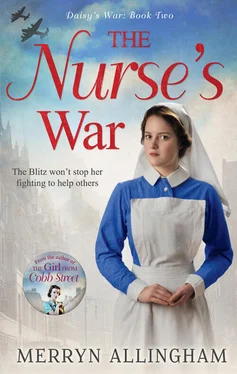MERRYN ALLINGHAMwas born into an army family and spent her childhood on the move. Unsurprisingly, it gave her itchy feet and in her twenties she escaped from an unloved secretarial career to work as cabin crew and see the world. The arrival of marriage, children and cats meant a more settled life in the south of England, where she’s lived ever since. It also gave her the opportunity to go back to ‘school’ and eventually teach at university.
Merryn has always loved books that bring the past to life, so when she began writing herself the novels had to be historical. Writing as Isabelle Goddard, she published six Regency romances. Since then, Merryn has set her books in the early twentieth century, a fascinating era that she loves researching. Daisy’s War takes place in India and wartime London during the 1930s and 1940s, and is a trilogy full of intrigue and romance.

To my mother who, with countless other women, fought the war on the Home Front.
‘The past is the present, isn’t it? It’s the future too.’
—Eugene O’Neill, Long Day’s Journey into Night
Cover
About the Author MERRYN ALLINGHAM was born into an army family and spent her childhood on the move. Unsurprisingly, it gave her itchy feet and in her twenties she escaped from an unloved secretarial career to work as cabin crew and see the world. The arrival of marriage, children and cats meant a more settled life in the south of England, where she’s lived ever since. It also gave her the opportunity to go back to ‘school’ and eventually teach at university. Merryn has always loved books that bring the past to life, so when she began writing herself the novels had to be historical. Writing as Isabelle Goddard, she published six Regency romances. Since then, Merryn has set her books in the early twentieth century, a fascinating era that she loves researching. Daisy’s War takes place in India and wartime London during the 1930s and 1940s, and is a trilogy full of intrigue and romance.
Title Page
Dedication To my mother who, with countless other women, fought the war on the Home Front.
Epigraph ‘The past is the present, isn’t it? It’s the future too.’ —Eugene O’Neill, Long Day’s Journey into Night
CHAPTER 1
CHAPTER 2
CHAPTER 3
CHAPTER 4
CHAPTER 5
CHAPTER 6
CHAPTER 7
CHAPTER 8
CHAPTER 9
CHAPTER 10
CHAPTER 11
CHAPTER 12
CHAPTER 13
CHAPTER 14
CHAPTER 15
CHAPTER 16
CHAPTER 17
CHAPTER 18
CHAPTER 19
CHAPTER 20
Endpage
Extract
Copyright
London, early April 1941
The footsteps were growing louder. Or at least more distinct in the darkness. Very gradually the sounds of night had fallen away and she had become conscious of the man’s step. She was in no doubt that it was a man. He had an uneven tread, as though he were limping. No, not limping, she thought, but walking uncertainly, as though he feared to give himself away. She had no idea how long he’d been following her, since it wasn’t until she was passing Middle Street that she’d become aware of him. It had been a long and exhausting day and she was almost asleep on her feet. The night shift had come on duty at six as usual, but the wards were full to capacity and she had volunteered to stay on. It meant returning to the Nurses’ Home alone, through the black pall that nightly covered the city.
At first the blackout had come as a severe shock. In an instant, the familiar had been transformed into the frighteningly unfamiliar. But after a while, like most people, she’d adapted. Now with only the slightest trace of moon to light her way, she was confident enough to walk almost blind around dim corners and through murky streets. Until, that is, she’d heard the footsteps. They were there still: left, shuffle, right, shuffle. She felt her shoulders grow tight at the sound and scolded herself for her timidity. They were in the middle of a war and she was falling into panic over a man’s footfall. After all he’d made no attempt to overtake her; in all likelihood he was an innocent, lost in a maze of unrecognisable streets and trying only to battle his way home.
For several minutes she was comforted. But then a thought struck, unbidden and unwelcome. For a stranger to lose his way in these streets would be extremely unusual. The only men she ever encountered at this time of night were there for a purpose. Patrolling wardens with their constant refrain of ‘Put out that light,’ members of the Home Guard who would flash her a greeting with their torches when they caught sight of the nurse’s uniform. This man was alone and surely it wasn’t her imagination that he walked stealthily. Whatever his intentions, she doubted they were benign. The blackout had brought its own troubles and not everyone was doing their bit for King and country.
Out of the darkness a freshness filled the evening air, the freshness of new grass. She must be approaching Charterhouse Square and thanked heaven for it. She was nearly home. In her eagerness to reach safety, she quickened her pace again. The clouds momentarily cleared and through the trees she glimpsed the outline of the Nurses’ Home, its pointed gables floating against the night sky and its large oak door standing sturdily on guard, a portcullis resisting all invaders. She was crossing the square now, fumbling in her bag; she must have her key ready for the minute she reached the door. But the man had increased his pace, too, and she was having almost to run to stay ahead. She fled across the grass, ducking between branches, brushing her way past newly budding leaves. By the time she reached the road on the far side, her heartbeat was drumming in her ears and her breath coming short. She sped across the last few yards of pavement, slowing herself as she reached the iron railings, then quickly up the whitewashed steps, the key clenched in a hand that she couldn’t quite keep steady.
The moon had once more disappeared behind a blanket of cloud and she was forced to feel for the lock. Let me get it right, let me get it right , her mind repeated frantically. The key slotted into the lock and she felt the breath escaping from her body in a sigh of relief. Then, without warning, a hand emerged from the blackness and wrestled the key from her hand. It fell uselessly to the ground, but when she opened her mouth to scream for help, another hand clamped itself to her mouth and stifled the cry.
‘Daisy. It’s me.’ The words hissed through the air.
Her attacker had said her name. But how? And whose was the voice?
‘You’re perfectly safe, but you mustn’t scream. If I take my hand away, promise you won’t.’
It could not be. It could not. She was hallucinating. He was dead. She’d seen with her own eyes his fall into the swollen river. He was dead, he was dead.
‘Promise you won’t make a sound,’ the man repeated. ‘Nod your head.’
It had to be his voice or it was that of his ghost. And she didn’t believe in ghosts. Dumbly she gave a nod and the hands released their hold. She stood not daring to move, her limbs immobile but her chest rising and falling in rapid motion. The figure beside her was searching for something. Then the sound of a match being struck and a small, solitary light flared for an instant. It was sufficient. She had not been hallucinating. The face had changed—the skin was weathered, the face bones gaunt, but it was him. It was Gerald. He had not died in that Indian river. For a moment she was overcome with a sudden nausea as the old guilt broke free of its moorings.
Читать дальше













